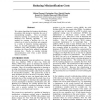110
click to vote
ICML
1994
IEEE
15 years 5 months ago
1994
IEEE
This paper describes a new methodfor inducing logic programs from examples which attempts to integrate the best aspects of existingILP methodsintoa singlecoherent framework. In pa...
113
click to vote
ICML
1994
IEEE
15 years 5 months ago
1994
IEEE
Compositional Q-Learning (CQ-L) (Singh 1992) is a modular approach to learning to performcomposite tasks made up of several elemental tasks by reinforcement learning. Skills acqui...
117
click to vote
ICML
1994
IEEE
15 years 5 months ago
1994
IEEE
With the goal of reducing computational costs without sacrificing accuracy, we describe two algorithms to find sets of prototypes for nearest neighbor classification. Here, the te...
126
click to vote
ICML
1994
IEEE
15 years 5 months ago
1994
IEEE
Reinforcement learning (RL) algorithms provide a sound theoretical basis for building learning control architectures for embedded agents. Unfortunately all of the theory and much ...
133
click to vote
ICML
1994
IEEE
15 years 5 months ago
1994
IEEE
Conservation of information (COI) popularized by the no free lunch theorem is a great leveler of search algorithms, showing that on average no search outperforms any other. Yet in ...
101
Voted
ICML
1994
IEEE
15 years 5 months ago
1994
IEEE
108
click to vote
ICML
1994
IEEE
15 years 5 months ago
1994
IEEE
This paper presents an approach to automatic discovery of functions in Genetic Programming. The approach is based on discovery of useful building blocks by analyzing the evolution...
128
click to vote
ICML
1994
IEEE
15 years 5 months ago
1994
IEEE
We explore algorithms for learning classification procedures that attempt to minimize the cost of misclassifying examples. First, we consider inductive learning of classification ...
115
click to vote
ICML
1994
IEEE
15 years 5 months ago
1994
IEEE
We describe CLIPS-R, a theory revision system for the revision of CLIPS rule-bases. CLIPS-R differs from previous theory revision systems in that it operates on forward chaining p...

